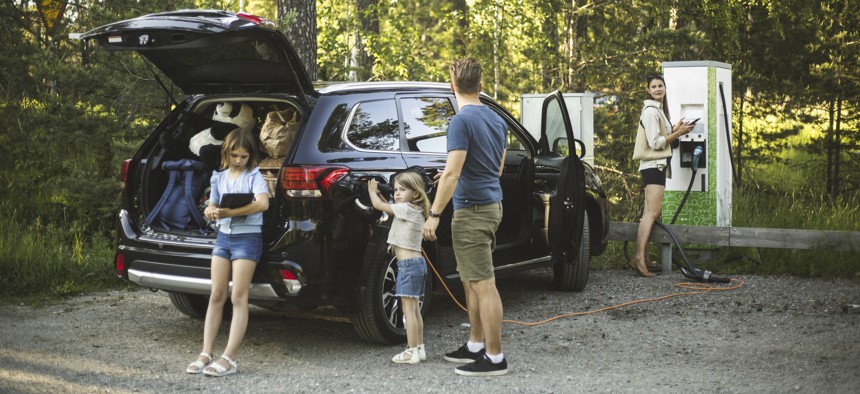Drivers Wanted Electric Vehicles Even Before Gas Prices Skyrocketed

Maskot via Getty Images
But barriers remain to widespread adoption, a new survey finds, including lacking awareness about state and federal purchase incentives and a limited charging network.
A growing number of U.S. drivers wanted to own electric vehicles even before gasoline prices began skyrocketing, according to results of a survey conducted by Consumer Reports. The newly released report shows that 71% of respondents said they were interested in buying or leasing an EV, and 14% said they would "definitely" buy or lease an EV if they were "to get a vehicle today."
When compared with traditional cars and trucks, EVs can save their owners thousands of dollars a year in fuel and maintenance costs. About 30% of the more than 8,000 survey respondents said they were interested in EVs because they cost less to drive, own and maintain.
The Consumer Reports survey was conducted Jan. 27 to Feb. 18, when the national average price for a gallon of regular gasoline rose from $3.34 to $3.52. The average per-gallon price skyrocketed over the next four months, reaching an all-time high of $5.02 on June 1, according to AAA. As of July 8, the price had fallen to $4.72.
'Policymakers Need to Do More'
More than 50% of survey takers said tax rebates or discounts would encourage them to buy more efficient vehicles. The federal government offers a tax credit of up to $7,500 for many EV purchases, and many states offer incentives, too. However, 46% of the respondents said they didn’t know about the perks.
“Our findings suggest automakers and policymakers need to do more to address concerns about charging and costs, and educate people about the available savings and incentives for EVs,” Quinta Warren, associate director of sustainability policy for Consumer Reports, said in a statement.
There are other challenges to EV adoption, too, the report noted. The top three barriers are charging logistics, such as where and when drivers can charge; the number of miles EVs can go on a single charge; and the costs involved with buying, owning and maintaining an EV.
Some progress has been made in those areas. There are more than 48,000 public EV charging locations nationwide, but low- and moderate-income communities need greater access, according to Consumer Reports.
The National Electric Vehicle Infrastructure Formula Program, launched in February under the bipartisan infrastructure law, will provide nearly $5 billion over five years to help states create a national EV charging network, which the Biden administration said in a statement is "an important step towards making EV charging accessible to all Americans."
EVs can go about 250 miles on a charge. That’s many miles more than most people typically drive per day, so charging at home overnight satisfies most EV drivers’ needs. The survey found experienced EV owners don’t consider range to be a big issue.
Consumer Reports said its EV survey of 8,027 U.S. consumers is its largest national survey sample ever. For more information from the report click here.
Jean Dimeo is the managing editor of Route Fifty.
NEXT STORY: System Shaves 75% Off Electric Vehicle Battery Test Time





